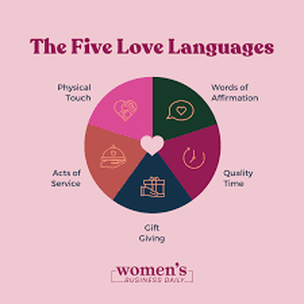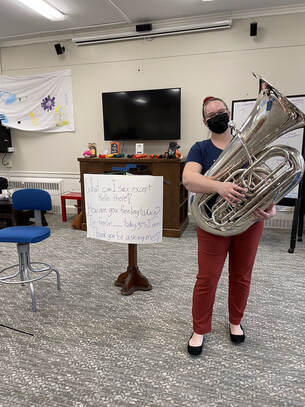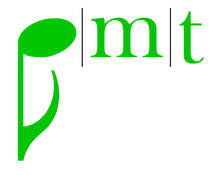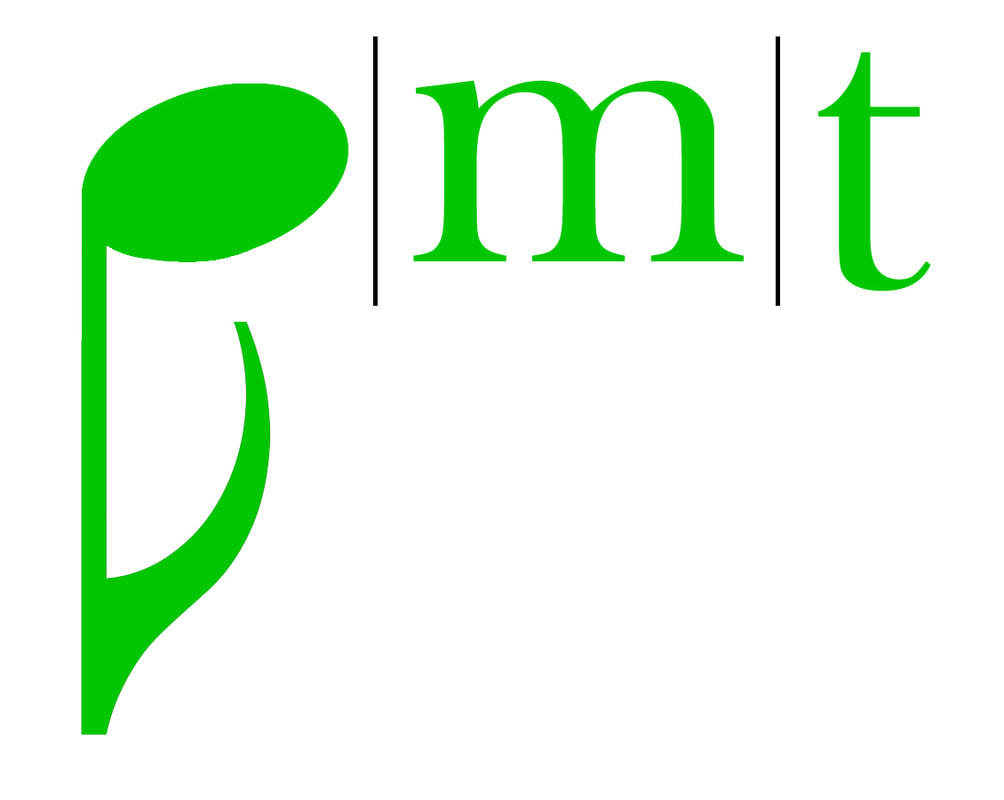|
BY: Gabby Jones, Music Therapy Intern  Light pink box with dark pink writing at the top of the box, reading, "The Five Love Languages". Pie chart underneath containing, in clockwise order, a green section reading "Words of Affirmation" with a word bubble, a dark pink section reading "Quality Time" with a clock, a dark blue section reading "Gift Giving", with a small gift in a palm, an orange section reading "Acts of Service" with a palm holding a dome food plate covering, and a light pink section reading "Physical Touch" with a heart and two palms touching. Light pink box with dark pink writing at the top of the box, reading, "The Five Love Languages". Pie chart underneath containing, in clockwise order, a green section reading "Words of Affirmation" with a word bubble, a dark pink section reading "Quality Time" with a clock, a dark blue section reading "Gift Giving", with a small gift in a palm, an orange section reading "Acts of Service" with a palm holding a dome food plate covering, and a light pink section reading "Physical Touch" with a heart and two palms touching. October 24th is “National Make A Difference Day”, and I firmly believe in making a difference in not only the larger world around us, but in the lives of the people we love the most. Something that I have always found important is loving my family and friends in the ways that make them feel the most loved. Because of this, I work hard to understand the ways in which each individual likes to feel special, or rather, their love language. The five love languages were first discussed in Gary Chapman’s 1992 book, The Five Love Languages: How To Express Heartfelt Commitment to Your Mate. Chapman outlines how an individual’s love language describes how they best receive and express love. The first is “Words of Affirmation”, meaning that an individual feels most loved when simply being told they are loved and appreciated, or reassured in their importance in another person’s life. The second is “Acts of Service”, meaning that an individual feels most loved when someone does something for them, such as folding their laundry, making dinner, or assisting in a difficult project. The third love language is, “Receiving gifts”, meaning that an individual feels most loved when given something special. The fourth love language is “Quality Time”, meaning that an individual feels most loved when spending uninterrupted and undisturbed time with people they love. The last love language is “Physical Touch”, meaning that an individual feels most loved when being touched by their loved one, such as being given a hug or a kiss. Recently, in a group session themed around acts of kindness and love, I discussed love languages with the members of the group. I chose a song to represent each of the five love languages, and I asked each group participant to share which song and love language resonated most with them. Here is the list: Words of Affirmation: Metta Chant by Barbara Dunn (May You Be Well) Acts of Service: Lean On Me Gifts: Magic Penny Quality Time: Stand By Me Physical Touch: I Wanna Hold Your Hand Love languages are powerful in creating connections with others. Understanding how a person feels appreciated and cared for can allow you to better establish and maintain a healthy relationship. Additionally, communicating your own love language can help others understand when and how you need to be reminded of their love for you. As therapists, understanding love languages in the people you work with can help in noting which ways individuals best receive feedback, encouragement, or reassurance. This can help with rapport within groups, not just between clients and staff, but between participants altogether. Building rapport between clients is just as important as creating connections between client and therapist. Additionally, understanding fellow staff members’ love languages can assist you in best supporting each other! What is your love language? How does your love language play a role in your personal life? How does your love language play a role in your professional life? Is there a specific song that you feel best represents your love language that varies from the list above?
0 Comments
A day here at Piedmont Music Therapy is always exciting! Below is a list of songs that will take you through a day in the life of a Piedmont Music Therapy Intern, by Mary Kiefriter. Perfect Day - I like to start my days with a positive mindset, upbeat music and a big cup of coffee. I’ve realized that your mindset for the day can have a bigger impact than you think. Drivers License - After I get ready I drive to the main clinic to do some work before my first session. This includes finishing up documentation, tuning ukuleles for a group session or making visuals. Dynamite - Some days I might have a dynamite session where I lead my interventions well and the clients meet their goals. When using the preferred music of clients their engagement increases which motivates them to participate and reach their goals. Shake it Off - Things can change quickly in the world of private practice. This can be anything from a client becoming sick and needing to cancel their session to a group having different clients than you had expected or planned for. Whenever this happens we shake it off and keep moving through our day. Paperback Writer - We document each session in order to track the client’s progress during treatment. Documenting and doing paperwork is something I am still learning how to do as an intern. Each supervisor completes documentation differently so I have the opportunity to see multiple different ways of documenting client information. Shotgun - Because we drive to and from different locations to provide mobile services we often carpool to save gas. Carpooling also builds time in our busy schedules to discuss a session and get feedback from our supervisor. Bye Bye Bye - Before I leave for the day I pack up what materials I can for my sessions the next day in order to be more efficient with my time. I make notes for each of my sessions to complete my documentation at home. I tell everyone at the clinic goodnight and head home. If you would like to listen to this playlist just click here! Comment below to let us know if your daily routine relates to any of these songs.
 My name is Mary Kiefriter and I am the newest intern here at Piedmont Music Therapy! My main instrument is tuba and ever since I started college I wanted to incorporate it into my music therapy sessions. The tuba is a large brass instrument that weighs about 20 or 30 pounds, depending on the type and is the lowest pitched instrument of the brass family. At first, I had no clue how to do this, especially because most of my colleagues in music therapy classes were vocalists. Luckily I had a fantastic tuba professor at East Carolina University, Dr. Jarrod Williams, who learned about music therapy in order to help me best prepare for my career. Ear training became a part of my weekly lessons and I slowly but surely learned how to listen to a melody and figure it out on my own without looking at sheet music. After learning melodies we worked on learning some funky bass lines that I could play while clients could have the opportunity to improvise on different pitched instruments that sounded in the same key as the bass line I played. I first used tuba in a session during my first practicum experience in a Memory Care Unit at a nursing home. I learned the melodies of client preferred songs such as “Side by Side”, “This Land is Your Land” and “Sway” on tuba and led an intervention similar to “Name that Tune”. Using tuba for this intervention gave a fun twist to the session by listening to an instrument some clients had never seen or heard before. Using an instrument that was different increased the clients interest in the intervention which in turn increased their engagement allowing them to participate to the best of their abilities. My favorite time I have used tuba in a session was during my practicum at a rehabilitation center for adolescents with substance use disorders. The clients were instantly engaged and interested in my tuba and began to initiate social conversations with one another about the tuba and other instruments they played at school. Using your main instrument, especially if it is a brass or woodwind instrument, can be challenging. The biggest challenge of using tuba in music therapy sessions was figuring out how to be more efficient with my nonverbal cues and body language since I can not give verbal prompts while playing my brass instrument. I have found that using tuba or any other wind instrument is especially useful when working on goals such as increasing focus of attention and increasing impulse control because of the limited verbal prompts you can give. This is because the clients have to increase their focus on your body language and nonverbal cues. I am excited to continue using tuba in sessions and getting more creative in how I can use it to help clients reach their goals! Comment below some of your favorite songs you think would sound interesting on tuba. |
PMTProviding music therapy services for early childhood to older adults, music instruction and enrichment plus continuing music therapy education in Greater Charlotte Area of the Carolinas. Archives
May 2024
Categories
All
|
Piedmont Music Therapy is a 501(c)(3) status organization.
Piedmont Music Therapy accepts donations via venmo @piedmontmusictherapy or any amount through QuickBooks. Contact us to arrange an electronic pledge!
Main Location |
|


 RSS Feed
RSS Feed
